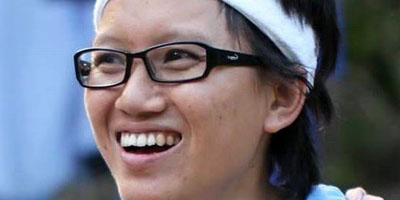Growing up in a refugee camp in Myanmar as an ethnic minority, young Naw Hsa Moo dreamed of becoming a doctor, but for refugees like her there was no opportunity for higher education. After joining a community radio program, her interest was redirected and she took the opportunity to study journalism. “We are stateless, but the organization of community radio programs trained us like training citizens,” she said. But being a journalist in Myanmar comes with risks and obstacles, especially after the coup. “There is no freedom of expression, and there is no right for the journalists to report the truth.”
To gain an insight into the condition of the journalists in Myanmar, I spoke to three professionals in the field:
- Naw Hsa Moo, a Karen activist and journalist in Myanmar,
- Phil Thornton, a journalist and senior advisor to the International Federation of Journalists (IFJ) in South East Asia, and
- Oliver Slow, an award-winning British journalist who has spent the past decade reporting across Southeast Asia, primarily Myanmar. He is the author of “Return of the Junta: Why Myanmar’s Military Must go Back to the Barracks”.
Despite different backgrounds, they all see the deprivation of press freedom under authoritarianism as a disaster for the country’s future of media industry. Journalists from both Myanmar and the international community are actively seeking solutions as they dodge government censorship and continue working, but they are concerned that the situation is too little known for major changes to be made.
Naw Hsa Moo: Being a journalist in Myanmar
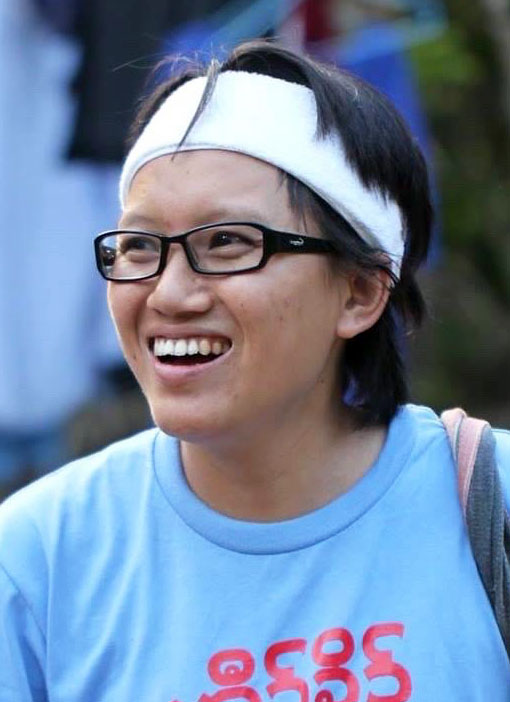
“When I was working with Radio Free Asia, I described details of a Burmese army rape case on a report, and my editor said it was not appropriate and asked me to rewrite it. I got angry, and I just wanted to tell everything that the Burmese army did to the people. The army just does whatever they want.”
Facing a dire situation, journalists in Myanmar adopt strategies to avoid government censorship, such as fleeing to other countries to report from an environment with more press freedom. Nevertheless, Moo points out that this takes away journalists’ opportunities to bring first-hand information, which undermines the credibility of their reporting.
Another strategy is to develop a community radio program, which Moo has plenty of experience in; she is now training new members who aspire to join her radio program. Moo explained that the program is a great tool to reach out to people in a wide area, and it functions when the internet and telephone signal is cut out— a situation that happened during the military coup. Since the radio program is not affiliated with the government, she says that the staff have more freedom in deciding the content to broadcast. “We do whatever is important for our community, for our audience to understand the current situations.”
Many people of Myanmar have protested against the brutality of the military, with an unprecedented scale of civil disobedience since the coup. The same spirit is also salient in Myanmar’s journalism. As a Karen journalist, Moo is proud that, despite the ethnic conflicts in the country, journalists of all ethnicities are fighting for the same cause and united against the atrocities of the military. “I’m currently working for Karen community and also other ethnicities from Myanmar. I wrote about our ethnic struggle, but we are facing the same problem.”
Phil Thornton: Weapons the military uses against journalists
“Since the coup on February 1st, 2020, when the military violently overthrew the democratically elected government, over 135 journalists have been arrested or jailed, 3 have been killed while working, 52 are now jailed, both men and women. They have been charged with violation of community acts – terror acts – just for criticizing either the military or the state, the military-appointed state administration.”
According to Thornton, the restrictions for journalists work in two ways. Firstly, it is illegal for journalists to do their job. Secondly, companies could not pay them. Independent media struggle to find a way to keep broadcasting.
“Many of the journal and media outlets were closed down. Many of them fled on quite an arduous journey to reach borders on the country’s edges, to places like India, China, and Thailand. And some of those people have managed to set up again,” he said. However, even for those who are able to continue working, the conditions and the reward are no longer the same. “People are mainly relying on giving it (the report) for free on the minimum amount of internet services that they have.”
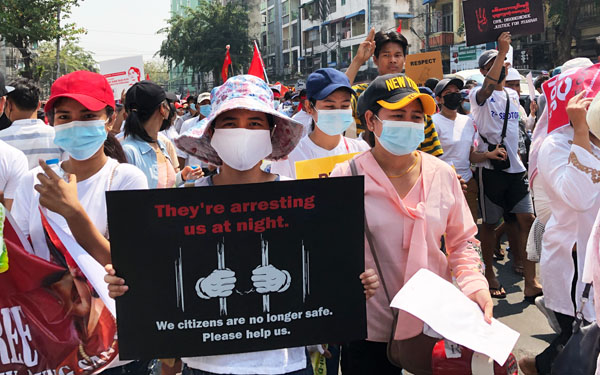
The strict restrictions and harsh punishment of violation have made fleeing to another country a necessity for most journalists who wish to keep working, since working as a free independent journalist in Myanmar is almost a crime. To legalize the arrest of the journalist, the military uses a panel code, section 505a. Thornton believes section 505a is a stark example of the nature of the military’s power. “This is a military that took power illegally, and it is using whatever means it can.” Eliminating political dissents is packaged in forms of legalese, but the reality is much less lawful and much crueler.
“Around 14,000 citizens have been arrested. In these cases, you are dragged off to interrogation centres. If you are not at home when they come to arrest, they will often take family members in your place. And for many days, you are going to be tortured, interrogated, and made to endure all forms of psychological terror.”
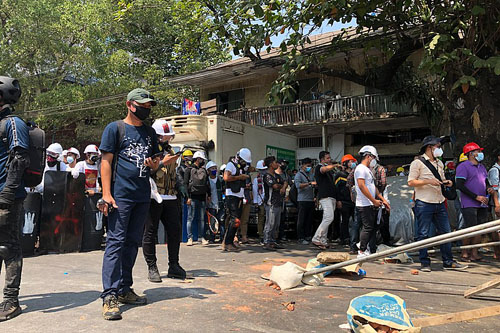
Thornton believes that using extreme strategies, such as inventing section 505a and weaponizing COVID to prosecute journalists who try to uncover the incompetence of the government in dealing with the pandemic, is a natural step for the military to take control over the country given its unpopularity. In the 2020 election, the National League of Democracy (NLD) won over 80% of the vote whereas the military-backed Union Solidarity and Development Party (USDP) only achieved around 14%.
The consequence of the gap is much more severe than people think. “The military saw this as a threat to its power, and its power is cemented in the number of companies and corporations that it runs independently without any scrutiny or having to pay taxes,” Thornton told me. “So this was a significant threat not only to its political power but also to its economic power,” He says that, as a result, the military will spare no effort in wiping out dissent to reclaim its political and economic power.
As the domestic situation has escalated into a brutal civil war, people from Myanmar are in desperate need of international aid. International organizations like IFJ have been actively providing help to local journalists: “IFJ is working with its affiliate in my journalist network, and trying to find ways and means of encouraging journalists to keep working and supplying news. It is also developing things like trying to get journalists to be safe in the working,” Thornton said. He stressed the importance of international cooperation in news media in a crisis like this, especially in protecting and recognizing the media groups producing footage of the current situation.
Oliver Slow: How to end the crisis
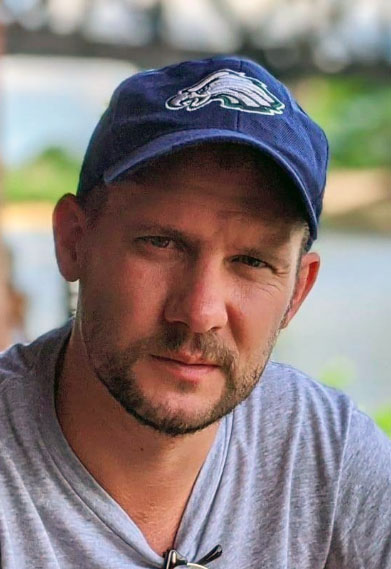
With years of experience as a journalist in Myanmar, Slow has witnessed the escalation of press freedom deprivation in recent years as military control tightens. In 2015, his reporting on the USDP created a lot of tension, and in 2017, his reporting about the Rohingya crisis also brought concerns. “Our staff were receiving death threats, receiving threatening messages online. We had to take precautions to really look after our security.” However, he says that what happened after the coup in 2020 was even worse than the previous experiences, with journalists being jailed and killed. “I think Myanmar right now is probably one of the most difficult places to be a journalist.”
As a journalist who works outside the country, in a place with press freedom, Slow thinks the biggest harm of the extreme media censorship happening in Myanmar and other authoritarian regimes is the creation of a massive distrust in media. Such skepticism makes media outlets struggle financially, lacking resources to produce quality reports that in turn further deteriorates trust. To alleviate the financial burden of local journalists, Slow has tried to organize fundraising for journalists who fled to the borders. However, he has to be very discrete when working with journalists inside the country, since being exposed not only put the journalists themselves but also their families at risk, even if they are in exile.
In Slow’s book, “Return of the Junta,” he examines what is needed to remove the military from power in Myanmar. Part of the answer lies in the unyielding spirit of Myanmar’s journalists. Now, even with the extraordinary risks and despite differing ethnicities and affiliations, journalists all over the country are doing an incredible job reporting on what is happening, taking advantage of technology such as VPN, social media, and cell phone videos. “People saw, I think for the first time, especially in the center of the country, that the military was using these really violent tactics. Social media and videos were really important to sharing that world. So I think they are doing all they can in really difficult circumstances.”
However, even with Myanmar journalists’ effort to spread the information, the response from international media has been disappointing, according to Slow: “The story happening there has disappeared from international news. After the Myanmar coup, we saw a lot of coverage. Then as time went on, it fell from the international radar.” Slow thinks the Ukraine conflict is a noticeable factor of distraction, although the atrocities from the military have not been alleviated in the past 18 months: “Just today. I read about someone involved in the resistance who was arrested, and then his body was returned. It maybe had been tortured to death. But again, it was pretty short-lived. Things moved on quite quickly.”
Slow believes the only way to bring the current situation to an end is for the military to be removed from power. However, the hope seems slim. Apart from the international media, other major organizations, such as the United Nations Security Council, have failed to implement any substantial sanctions on Myanmar since the coup happened. Nevertheless, Slow stressed that economic sanction is not the best way since it hurts the Myanmar people.
Instead, he thinks that targeted sanctions against the military, such as an arms embargo, would be more helpful. Another strategy could be supporting the democratic counterpart, the National Unity Government of Myanmar, which comprises the representatives from the parties deprived of power from the military since the coup, including members of NLD and other ethnic minority insurgent groups. He says that this would mean holding meetings with them, and providing financial support and training to build up their resources and be recognized as the government. For these strategies to work, the presence of Myanmar journalists who report on the actions of the military junta to the international community is necessary.
The future of journalism in Myanmar
With the brutality of the military, being a journalist seems to be the least enticing career in Myanmar. Does that mean journalism in Myanmar holds no future at all?
Slow is optimistic: “I was in Myanmar when emergence from dictatorship was happening, say a decade or so ago. And there was an emergence of a lot of independent news outlets. And we hired a lot of Myanmar people who were okay. They didn’t have a lot of training, and it sometimes took a lot of work to try and get them up to certain standards. But eventually, over time, we saw the emergence of really, really good journalists, really good news outlets doing important stuff.”
Thornton also believes the dedication and determination of Myanmar’s journalists will continue to be strong positive energy in the dark time: “Myanmar journalists are enthusiastic and keen to keep working. Many of them are shored up now in small safe houses, trying to work out ways that they can keep working and keep broadcasting, whether it’s on a Facebook platform or other social media platform, or just their own website. Even in the last couple of days, I’ve talked to journalists who’ve been shot in the face from close range with rubber bullets and are still keen to work and not looking to resettle to a third country.” He also thinks that this enthusiasm is what the journalists in western countries, where the idea of journalism is more framed inside of the concept of vocation, tend not to have and therefore appear more valuable.
Overall, journalists in Myanmar show incredible resilience and professionalism in their job, which adds a voice of hope to the current situation. As Thornton puts it, their passion for a career in journalism comes from the cause of democracy, which they share with thousands of Myanmar citizens.
Photos licensed under the Creative Commons Attribution-Share Alike 4.0 International license.

